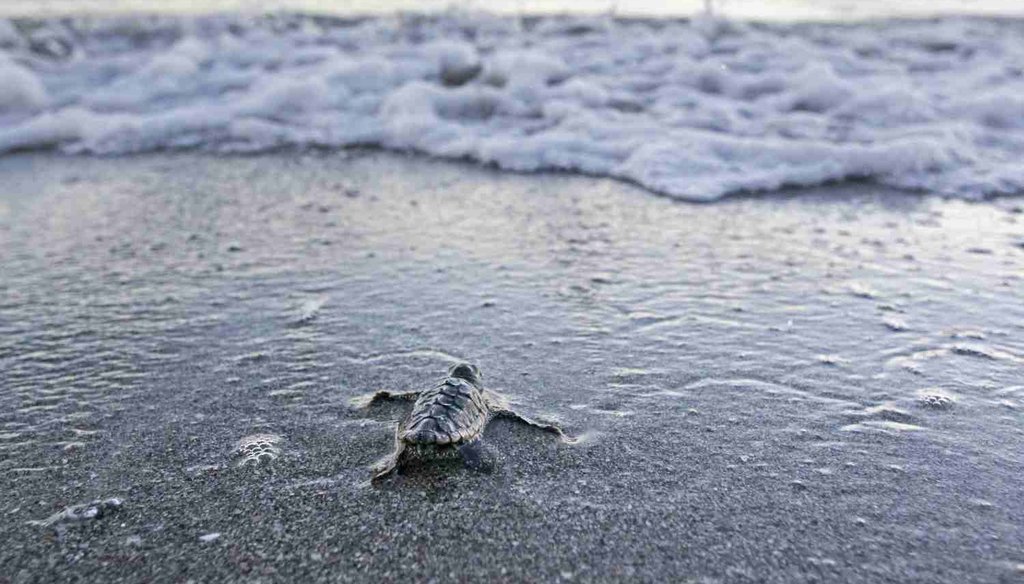Stand up for the facts!
Our only agenda is to publish the truth so you can be an informed participant in democracy.
We need your help.
I would like to contribute

A recently hatched loggerhead turtle heads for the sea on Redington Beach. (photo by Jim Damaske, Tampa Bay Times)
When billionaire activist Tom Steyer declared that he would use his fortune to attack candidates who didn’t believe in man-made climate change, that set the stage for the environment to play a prominent role in this year’s race for governor in Florida.
Steyer formed a political action committee, NextGen Climate Action Committee, and set his sights on Republican Gov. Rick Scott, in addition to candidates in other states.
Environmental issues have arisen in past campaigns, but what was unique about Florida this year was that a pro-environmental entity had millions to spend on TV ads.
Scott’s rival Democrat Charlie Crist weighed in with his own statements about the environment, including our state’s record on solar energy.
Scott and the Republicans countered with attacks on Crist about Duke Energy and about riding in a private jet.
Sign up for PolitiFact texts
NextGen ads
NextGen Climate launched several ads that related to Duke Energy, the North Carolina-based electricity provider that merged with Progress Energy in 2012.
One ad said Scott is "letting Duke (Energy) keep collecting billions" after the utility company took in advance fees from customers for two failed nuclear project.
The claim leaves out the full context. The state’s Public Service Commission settled with the utility for $3.2 billion, not the governor or the Legislature. Scott and lawmakers have a say in who serves as commissioners, but the board’s decisions in utility matters is final. Scott could have used his influence to ask for changes or chosen different commissioners, but he’s been notably silent on the issue. Considering that conflicting evidence, we rated the statement Half True.
We also fact-checked NextGen ads about oil drilling near the Everglades.
One ad said Scott took $200,000 in campaign contributions from a company that "profited off pollution."
That’s partially accurate. Scott’s campaign received $50,000 from four different members of the Collier family. The Collier Resources Co. leased mineral rights on its land to another drilling company. However, the ad omitted the name of that other company -- Dan A. Hughes -- and preliminary tests showed no contamination. We rated that claim Half True.
NextGen then fine-tuned its attack and said that Scott took $200,000 from a family that leased land for drilling "and now he is trying to hide from it." The part about the contributions was correct, but NextGen exaggerated when it said that Scott was trying to "hide" the donations, which were publicly reported. We rated that claim Half True.
Republican Party attacks Crist
Scott’s side launched its own counterattacks about the environment.
The Republican Party of Florida said in a TV ad that "Crist made it easier for Duke to take your money. Crist signed a law helping Duke get billions, while Rick Scott put a stop to the Crist giveaway."
Blaming Crist for Duke getting money isn’t accurate. Gov. Jeb Bush signed the original 2006 law. Crist signed a 2008 amendment that added the planning of transmission lines to the list of approved uses to the fee. But it doesn’t appear Duke Energy ever collected advance fee money to plan transmission lines from its two nuclear projects. We rated the ad’s claim False.
In another ad, the Republican Party said Crist rode on a jet that "belongs to a serial polluter with a history of environmental violations fined nearly $2 million for polluting water."
That’s accurate. The plane’s owner, Bay County contractor James Finch, has been fined almost $2 million in the past for filling in wetlands or allowing unfiltered runoff to flow into waterways, in violation of environmental permits. We rated the claim True.
Environmental spending and priorities
During the CNN debate Oct. 21, Scott said, "We have spent $350 million to deal with sea-level rise" in the Miami area and "hundreds of millions dollars to deal with coral reefs."
Scott is exaggerating. The state has spent $100 million to help the Keys upgrade to a sewer system, which should improve water quality -- a benefit for coral reefs. Scott omitted that it was under Crist that the Legislature passed a law paving the way for the money. For the sea-level rise portion of his claim, his spokesman pointed to a variety of projects that related to flood mitigation or beach protection. While those are worthy projects, they don’t combat future sea level rise. We rated that claim Mostly False.
Shortly after he announced he was running for governor, Crist said in an interview on MSNBC in November 2013, "We’re the Sunshine State, and we’re hardly doing any solar energy production." That would be a line he would repeat many times during the campaign, and it was largely accurate.
At the time, Florida ranked in the top 10 states nationally for installed solar energy capacity. (We are now ranked 12th.) Given how much sun Florida gets, it is something of an underperformer nationally, and its policies -- a lack of a renewable portfolio standard and the existence of strict laws governing electricity sales -- pose challenges to future development of the state’s solar resources. We rated that claim Mostly True.
In March 2014, Scott said during his State of the state speech that "we have invested record funding in protecting our environment." That’s not correct. Scott’s spokesman said that he was referring to his "record" proposal to fund springs protection. But springs are only a subset of environmental projects. The budget for the state Department of Environmental Protection was not a record under Scott -- it was higher in more flush financial times under Bush and part of Crist’s term, and then plummeted along with the economy in the second half of Crist’s tenure and Scott’s tenure. We rated the claim False.
Flip-O-Meter and promises
We evaluated whether Crist and Scott changed their stances on a variety of topics and placed them on our Flip-O-Meter.
We gave Crist a No Flip on oil drilling. Crist repeatedly spoke against drilling for much of his career, though in 2008, while a GOP vice presidential contender, he said Florida should study drilling with caveats. The 2010 Deepwater Horizon explosion put the lid on that discussion for Crist.
We have tracked dozens of Scott’s 2010 campaign promises, including to expand the use of nuclear power and alternative fuels. Scott approved new nuclear plants at Turkey Point -- a project that is about a decade away. There has been some growth in the use of solar, but it still remains a very small portion of Florida's energy generation. We gave Scott a Compromise.
Scott also promised to explore oil drilling in a safe, environmentally sound way. We saw no significant steps by Scott on that and gave him a Promise Broken.
Our Sources
See individual fact-checks for sources



































